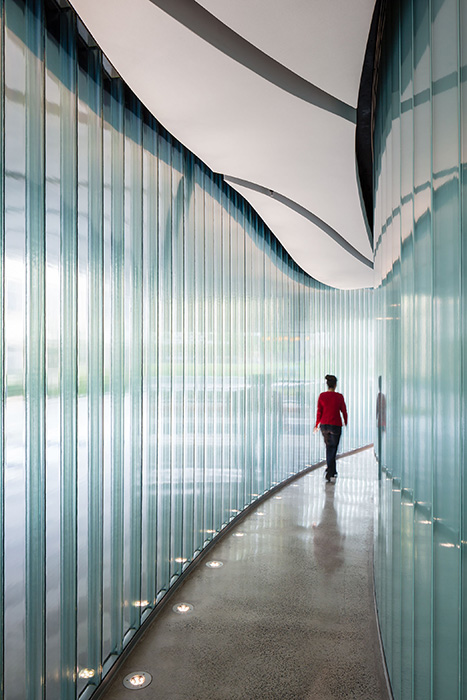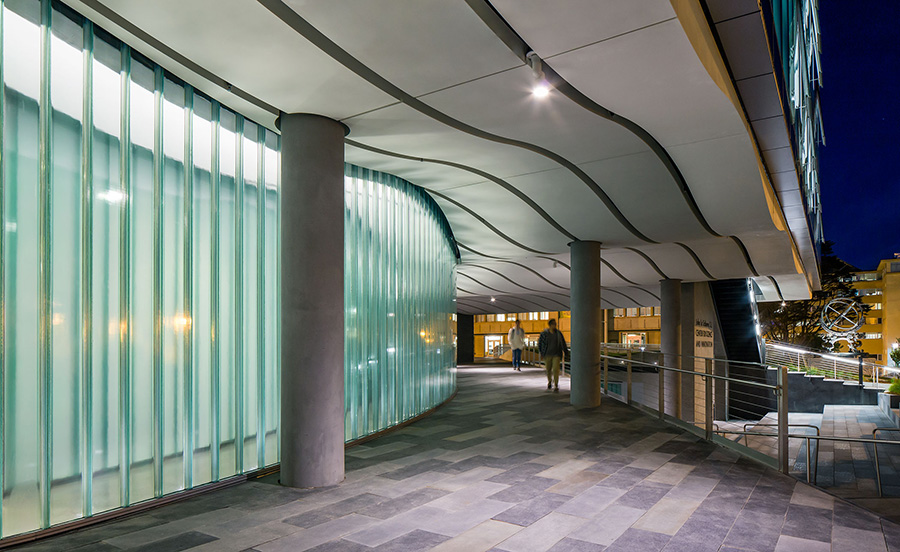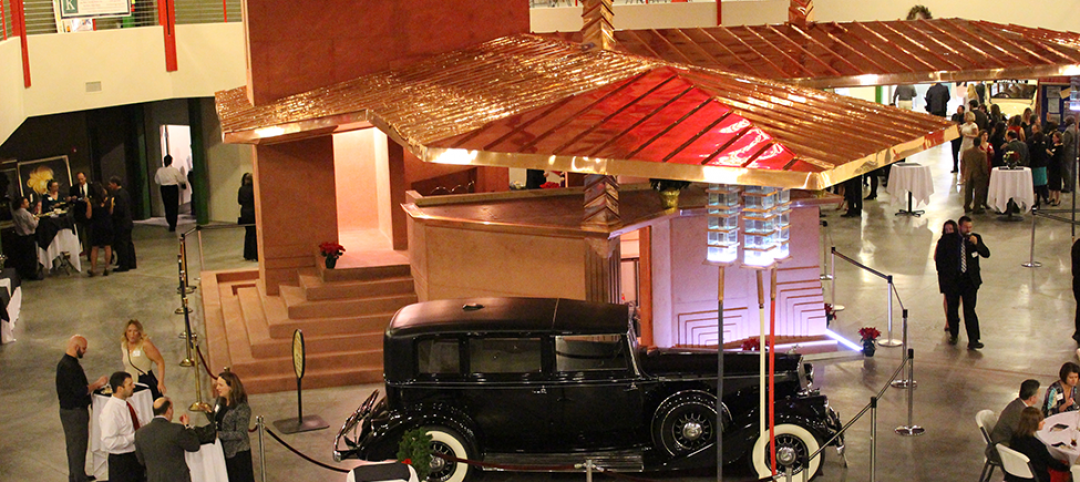Project: University of San Francisco, John Lo Schiavo, S.J. Center for Science and Innovation
Location: San Francisco
Architect: NBBJ
Glass: Pilkington Profilit™ translucent channel glass system with Lumira® aerogel insulation
Glass Supplier: Technical Glass Products
The University of San Francisco’s new John Lo Schiavo Center for Science and Innovation (CSI) brings science to the forefront of academic life. Its glossy, three-story exterior invites students into the facility, and then flows sleekly down into the hillside where below-grade laboratories and classrooms make efficient use of space on the landlocked campus.
For NBBJ architects, the inspiration for the new building came from the faculty’s desire to bring passion to the study of science within the USF academic curriculum. “A key driver behind the CSI was to put science on display and create buzz within the student body,” says Lilian Asperin-Clyman, principal at NBBJ.
To meet functional demands and generate the desired interest in the science facility, the design team looked to high-performance materials. A curtain wall with fritted glass and flexible shades provides students with views to informal learning areas and outdoor spaces to encourage scientific discovery.
Skylights and glazed teaching walls with a writable surface and visual connectivity help bathe lower, “garden level” education areas in sunlight to blur the boundary between above- and below-grade. Sloped walkways promote seamless circulation between the building’s main campus and garden-level spaces.

Glazed channel glass corridor uses borrowed light. Photo: Technical Glass Products/NBBJ
In implementing the design vision, one challenge was to create an attention-grabbing, garden-level façade that satisfies acoustic and thermal performance demands. NBBJ found their solution with Pilkington Profilit™ channel glass from Technical Glass Products (TGP).
The linear, “U”-shaped, cast-glass channels are self-supporting and mounted in an extruded metal perimeter frame. In the case of CSI, they were installed vertically, forming tight radii as they animate and follow the curve of the building’s adjacent walkway. The combination of raked and curved channel glass heads and sills make the size and positioning of each channel glass piece unique, and allow the façade to transition between curved and straight sections. The lighting strategy where channel glass is used creates a dramatic “lantern” effect that contributes to the character of the exterior spaces after dark.
At the CSI’s main-level entrance, a second layer of channel glass mirrors a portion of the exterior channel glass façade to create a glazed corridor. Its clear channel glass interior and translucent channel glass exterior combine to create what San Francisco Chronicle architecture critic John King hailed as the building’s “most potent architectural treat.”
“The glazed hallway adds dynamism to the building by highlighting the silhouette of students walking inside,” adds Asperin-Clyman. “It also improves safety on campus by allowing borrowed light to spill out from the building on to an area frequently traversed by students, faculty and visitors.” The sloped walkway complies with ADA accessibility requirements and connects the entrance lobby to the entry to the main lecture hall.
Both the exterior façade and glazed channel glass hallway help the design team meet thermal and acoustic performance goals. The design incorporates clear channel glass with a low-emissivity coating in a custom painted thermally improved frame with head receptor. In select locations, the use of Lumira® aerogel in the enclosed space between the channels helps enhance energy performance and reduce sound transmission.
“By using unique, structurally sound and high-performing materials like Pilkington Profilit channel glass, we were able to experiment with geometry, layering and lighting to create spaces that not only attract students, but also satisfy the facility’s highest functional requirements,” concludes Asperin-Clyman.
Today, the innovative CSI building embodies the university’s mission to bring science and discovery into the everyday lives of students. It is designed to LEED Gold standards.
For more information on Pilkington Profilit, along with TGP’s other specialty architectural glass and framing products, visit tgpamerica.com.
Technical Glass Products
800.426.0279
800.451.9857 – fax
sales@tgpamerica.com
tgpamerica.com
Related Stories
| Jul 8, 2014
Does Zaha Hadid’s Tokyo Olympic Stadium have a design flaw?
After being criticized for the cost and size of her stadium design for the 2020 Olympics in Tokyo, a Japanese architect points out a major design flaw in the stadium that may endanger the spectators.
| Jul 8, 2014
Frank Lloyd Wright's posthumous gas station opens in Buffalo
Eighty-seven years after Frank Lloyd Wright designed an ornamental gas station for the city of Buffalo, the structure has been built and opened to the public—inside an auto museum.
| Jul 8, 2014
Lost in the Museum: Bjarke Ingels' maze will make you look up and around
The maze, located in the National Building Museum, is a precursor to an exhibit showcasing some of BIG's projects. To navigate the maze, people must look up.
| Jul 7, 2014
5 factors that can affect thermal stress break risk of insulated glass units
The glass type, glass coating, shading patterns, vents, and framing system can impact an IGU’s risk for a thermal break.
| Jul 7, 2014
Team unity pays off for a new hospital in Maine [2014 Building Team Awards]
Extensive use of local contractors, vendors, and laborers brings a Maine hospital project in months ahead of schedule.
| Jul 7, 2014
7 emerging design trends in brick buildings
From wild architectural shapes to unique color blends and pattern arrangements, these projects demonstrate the design possibilities of brick.
| Jul 7, 2014
A climate-controlled city is Dubai's newest colossal project
To add to Dubai's already impressive portfolio of world's tallest tower and world's largest natural flower garden, Dubai Holding has plans to build the world's largest climate-controlled city.
| Jul 7, 2014
How to keep an employee from jumping ship
The secret to keeping your best employees productive and happy isn’t throwing money at them, as studies have continuously shown that money isn’t the top factor in employee happiness. Here are four strategies from leadership coach Kristi Hedges. SPONSORED CONTENT
| Jul 7, 2014
Nothing fixes a bad manager
Companies seem to try everything imaginable to fix their workplaces, says Gallup Chairman and CEO Jim Clifton in a recent blog post, except the only thing that matters: naming the right person manager. SPONSORED CONTENT
| Jul 3, 2014
Gehry edits Canadian skyscraper plan to be 'more Toronto'
After being criticized for the original tower complex, architect Frank Gehry unveils a new design that is more subtle, and "more Toronto."

















